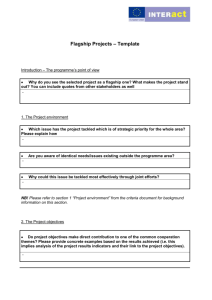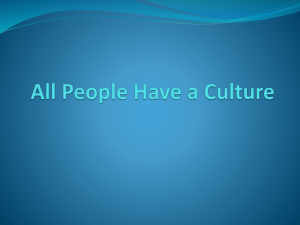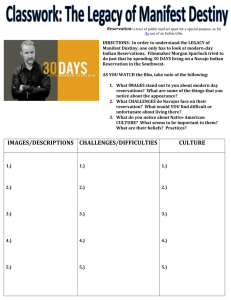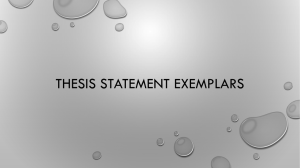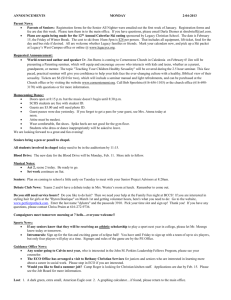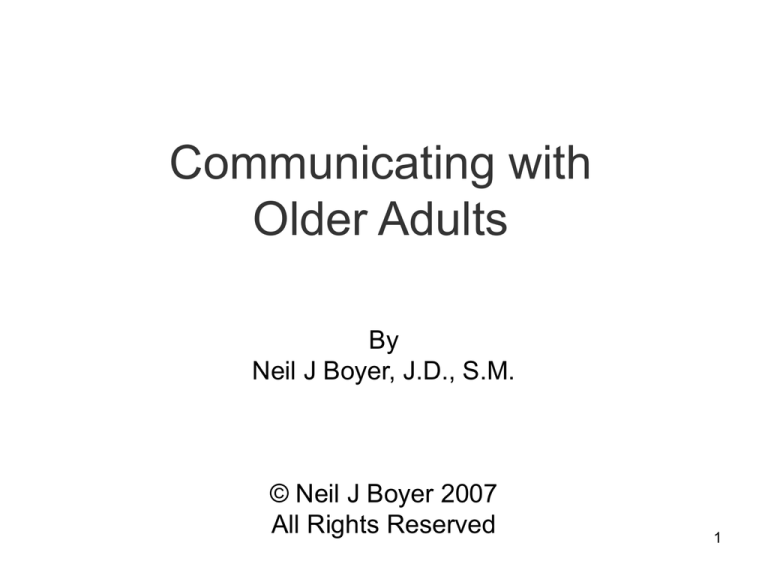
Communicating with
Older Adults
By
Neil J Boyer, J.D., S.M.
© Neil J Boyer 2007
All Rights Reserved
1
Development of older adults
Older adults continue to develop
Just like:
Babies
Children
Teens, and
Middle-agers
3
Dialectic of Development
Developmental drives come in pairs:
– Babies identify with their mother, and still try to
establish their own identity
– Teens depend on parental discipline and resources
and fight for complete independence
– Young adults revel in their growing command of life
and strive to become “successful”
– Middle Agers strive to preserve their individual space
in a fast changing world while seeking fulfillment with
new challenges
– Older adults struggle to main control in the face of
constant loss while defining their life’s legacy
4
Maintaining control in face of
constant loss
• It takes great focus and energy for older adults to
retain control over their lives and living
•
Older adults are constantly losing:
– relatives & friends
– health (physical control)
– dexterity
– memory
– sensory inputs (seeing, hearing, speaking, smelling, touch, tasting)
– balance
– occupation
– avocation
– physical attractiveness
– sexual function
– financial security
– ...
5
Finding one's legacy
• Loss of control can severely limit an older adult’s
ability to find their legacy
• To establish the worth of one's life
• To determine its meaning and value and
• To accept the legacy one will be leaving
• Older adults are reflecting and evaluating:
•
•
•
•
Relationships
Formative Events
Successes & Failures
Choices and Results
6
Callow Youth + Aging Sage
• It is incumbent on succeeding generations
to develop a better understanding of older
adults’ developmental process
• This will lead to more effective
communication with them
• Results will flow through the creation of
closer and more rewarding relationships
7
Babies Outrank Grandmas?
• The fact that older adults are experiencing
certain health problems does not mean that they
are “deficient”, only that they too are developing
• We do not think poorly of babies for trying to
walk, instead of crawl.
• “Old age is not a disease--it is strength and
survivorship, triumph over all kinds of
vicissitudes and disappointments, trials and
illnesses.”
Maggie Kuhn
8
Dementia results from disease
• The decline that we see when someone
develops dementia is not a function of aging
• It is caused by a disease (heart failure, stroke,
trauma, disease vectors like viruses or prions)
• True - older adults do experience changes in
body and brain
• So do babies – who lose billions of brain cells as
their brains organize themselves
• But neural connections grow exponentially
(only 100,000,000,000,000 or so)
9
Old age ≠Dementia
(Neuron loss from Alzheimer’s Disease)
10
So it is…
• With older adults, barring disease,
– all of us are losing neurons as we get older
– but the number of important connections is
relatively unaffected
– it is normal for adults 50 and older to lose ten
fifteen percent (10% - 15%) of short term
memory
– Our extremely plastic brains find ways to deal
with it!
11
Putting things in perspective
•
•
•
•
•
Older adults have “earned their spurs”
Been there – done that
Ain’t going back
So…
It’s up to younger folk to learn and
understand what’s happening and to make
allowances and adjustments for the
developmental “quirks” of older adults
12
Habits that inhibit
good communications
• We need to adjust our habits &
assumptions in dealing with older adults
• Just as we do to accommodate younger
people who are going through other
developmental stages
• For example:
13
Equating speed with incapacity
• Older adults do not process information as quickly as
younger people
– Multitasking may become more difficult
– Physical reflexes are not as quick
– Senses (vision, hearing) may be diminishing
• Scientific research shows that absent disease or other
illness, age does not significantly affect
–
–
–
–
–
Information management skills
Reasoning skills
IQ
Vocabulary
Verbal Ability
14
Approaching all problems
with linear logic
• As people age, they tend to use their right brain more
– Right brain becomes more active as "gatekeeper" in directing
intellectual processes
– Thinking more globally
– Less left brain control, so less linear thinking,
• More interested and attentive to metaphors and stories
to describe things
• Older adults are reminiscing & reflecting on their past in
order to "find their legacy”
• These “non-logical” endeavors are still vitally important
15
For as the experts say:
• Better to be approximately right than exactly
wrong."
John W. Tukey (Princeton Professor of Mathematics))
• Nearly all serious analysis requires multivariatethinking, comparison-thinking, and causalthinking.
Edward Tufte, Yale Professor of Graphical Analysis ("The Leonardo da Vinci of
data." THE NEW YORK TIMES)
• Older adults are often better at this than younger
people
16
Expecting immediate attention
to "doing"
• Time is a relative thing and older adults don't like
to be hurried or rushed into things.
– "Plant the idea and let it grow".
• Do not equate your sense of urgency about
getting something done with the older adults
sense of higher priorities
17
Expecting accomplishment or
production “today”
• Older adults’ development drives them in a
different direction.
– Reflection takes priority over rushing to conquer or
complete some activity or process.
• Work on developing a quality relationship
with the client and doing the best
professional work.
18
Expecting linear conversations
• Don't indulge in labeling the client's behavior.
– What you might characterize as mental "wandering" may
be evaluating, reflecting, or mentally "replaying" important
information.
– Capacity includes "weighing" the relative importance of
information, possible actions, etc.
• Use the time while the client is sifting and valuing to
pick up and analyze clues that the client is giving off
while mulling things over.
– Figure out how your services can best serve the client in view of
what you're understanding from the client's communications,
whatever it may be.
19
Equating repetition of thoughts
and ideas with incapacity
• Repetition of thoughts, stories, etc. are signs the
client is processing things in his/her own
framework.
• Think about what the client's communications
mean in terms of his/her values and use the
information to help determine how best to serve
the client.
20
Expecting identical solutions to
problems
• Value does not correspond with money or savings (e.g.
taxes saved.)
• An older client's goals may have little to do with saving
money, passing on the most inheritance to heirs, etc.
• The late Brooke Astor, heiress to the NY Astor family's
real estate fortune, said "Money - like manure - is best
when spread around."
• An older client may well value using his/her estate to do
something quite different from what the family or others
expect.
• The professional needs to get to the heart of what the
client really wants to "maintain control" and/or "create
their legacy"
21
Assuming that language holds
same meanings regardless of age
• The meaning of words will differ
depending upon one's age.
• The word "senior" to a freshman high
school student may be a nasty 12th
grader.
• To an older person, the word "senior" may
mean possible loss of driving privileges.
22
Approaches to Communication
• Choose language that is meaningful to the older
adult, in terms of their need to maintain control
or give value to their legacy.
– “If you decide to remain in your home, do you think it would help
to make some improvements that will help you get around?”
– “How do you think setting up this charitable lead trust will help
your children in the long run?”
“Present your products and services within the context of
how they help seniors retain control of choices, use of
money, where they live, and who benefits from a legacy.”
David Solie
23
Approaches to Communication
• Ask open ended questions
– You look a bit pensive today. What are you thinking
about?
– I'd like to hear more about that (your story)
“Legacy is all about discovery and discovery
begins with the right questions.”
David Solie
24
Final Thoughts
• Seniors may not be able to multitask like they once
did, but they are as smart, as insightful, and as
prepared to make intelligent decisions as we are.
• Become versed in stories and metaphors that
represent your expertise and your services and then
use them at the beginning of your conversations.
• You will discover that old adults have similar stories
and anecdotes to share with you. More important,
you will be amazed at how quickly and effectively
you “connect” with your senior client.
25
Additional Final Thoughts
• Go with their time flow and become fluent in the art
of “plant and wait.”
• Professionals who try to drive older clients with
artificial deadlines and high pressure closing
techniques usually find out they don’t work.
• Focus on the quality of your connection (i.e. stories
and metaphors) and benefits of your products and
services.
• They will signal when they are ready to move
forward.
26
More Final Thoughts
• Track non-linear conversations for values and themes.
• Look for important clues about what matters most to
older adults and what they value and why.
• Then spend some time figuring out how your products
and services complement these findings.
• Don’t be too quick to dismiss stories you have heard
before. Look at them based on the values and themes
they represent.
• What is being admired? How are these values
represented in your products and services?
27
Penultimate Final Thoughts
• Present your products and services within the context of
how they help seniors retain control of choices, use of
money, where they live, and who benefits from their
legacy.
• Understanding how to emphasize control in your
conversation with older adults can open important doors
when things appear stalled or impossible to resolve.
• Using life review questions can help seniors gather up
the stories and events that are crucial to the formation of
their legacy.
• These conversations will provide a roadmap for how
your products and services can help them honor and
preserve their legacy.
28
Last Final Thoughts
• The final growth stage in life is complex and
demanding.
• Seniors not only need our products and
services, but they need our willingness to
understand and work with their developmental
needs.
• We, in turn, need more meaningful contact with
older adults, to benefit from their perspective,
their lessons, and their example.
29
Remember
Age is an issue of mind over matter.
If you don't mind, it doesn't matter.
Mark Twain
Life isn't about finding yourself.
Life is about creating yourself.
George Bernard Shaw
30

